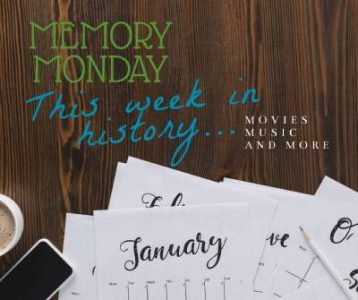❇️ This month in history ➡️ CPR Railroad – Touch-Tone Phones – Warning Labels on Music
❇️ November Mini Bites of History ❇️
DEVELOPMENT 🚂
NOVEMBER 7, 1885– The Canadian Pacific Railway is complete. The symbolic “last spike” is driven in Craigellachie, British Columbia.

The CPR was founded in 1881. It was formed to physically unite Canada from coast to coast. It took over four years to build. The first spike was in Bonfield, Ontario and the railway went west.
The railway has a long history. Although it was a huge accomplishment, it also had a darker side which should not be forgotten.
- Over 17,000 workers hired to work on the railroad to get it to completion, and they gave their lives to the building of the railway. It was dangerous work and workers were considered collateral damage, with not even notification of the families being made when lives were lost.
- The trickery that was used to convince Blackfoot First Nation, in Canada’s west, to allow the railway to go through their land. With promises made by the CPR and a life-time pass given tho Chief Crowfoot; the CPR and North-West Mounted Police pushed the railroad’s way across the land.
“The CPR was a modernizing influence that constructed a new society by marginalizing one that already existed.”
Toronto Ward Museum wardmuseum.ca
INVENTIONS ☎️
NOVEMBER 18, 1963 – The first electronic push button telephone was introduced to the public by Bell Telephone Company.
The touch-tone telephones and portable pagers were on display for the public to try out at the Seattle World’s Fair in 1962 and, a short time later, ready for the public to purchase.
These first touch-tone phones had only ten buttons, but in 1968 there was a twelve button model released. The addition of the Asterix and pound or hash key were later added.
Prior to the push button phone, it was all about the rotary dial phone, which was introduced in 1891.

MUSIC 🎵
November 1985– Warning stickers were placed on music albums that were deemed offensive.
The concern was over explicit content and how it was harmful to young fans. The Parent Music Resource Center (PMRC) launched the campaign and brought it to the United States Congress. But it was not without artists standing up for freedom of artistic expression. Artists that spoke at the congressional hearing included Dee Snider (Twisted Sister) and John Denver.
The Recording Industry Association of America (RIAA), who represented most recording companies, agreed to place these button shaped stickers that read “Warning: Tone of this record is unsuitable for minors.”
This warning label was changed to “Explicit Lyrics: Parental Advisory” and now standard warning label reading “Parental Advisory: Explicit Lyrics”.
History is very interesting; tells us where we have been, how the world was and often what mistakes have been made. Memory Monday is based on fun and fascinating bits of history that may not be the big events, but helped shape or bring us to where we are today. If you are interested in this type of history and writing short articles like I've been doing, please contact me at stacey@yourlocalbuzz.ca



